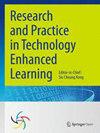个人、技术、社会环境如何影响Z世代在危机学习过程中利用视频分享平台?
IF 3
Q1 EDUCATION & EDUCATIONAL RESEARCH
Research and Practice in Technology Enhanced Learning
Pub Date : 2023-05-01
DOI:10.58459/rptel.2024.19003
引用次数: 0
摘要
在2019年席卷全球的COVID-19等危机中,包括面对面课程在内的社交和社区活动受到限制。一方面,这些限制旨在作为防止病毒传播的预防措施;另一方面,这可能导致没有教育过程的迷惘一代。尽管如此,通过视频分享平台进行在线学习被认为是在这种特殊情况下保持学习的最佳方式。然而,学生有自己的学习方式偏好。虽然基于视频的分享平台被视为促进自主学习的最具代表性的方式,但了解推动采用的动机至关重要。本文采用社会认知理论(SCT)作为理论视角,研究了激励Z世代利用这一工具进行自主学习的技术、社会和个人环境。从该队列中收集了总共251份调查回复,并使用结构方程建模方法进行了分析。研究结果显示,感知有用性和内容质量、同伴影响、自我效能感和结果三个角度分别显著决定了67.1%的人的采用意愿。这些发现在研究和实践方面为视频分享平台的接受提供了几个重要的启示。并对研究的局限性和未来的研究方向进行了讨论。本文章由计算机程序翻译,如有差异,请以英文原文为准。
How personal, technical, social environments affecting generation Z to utilise video-based sharing platform in learning process during crisis?
In a crisis such as COVID-19 that struck the world in 2019, social and community activities are restricted, including in-person classes. On the one hand, these restrictions are aimed as a precautionary measure against the virus spread; on the other hand, this could lead to a lost generation without an educational process. Notwithstanding this, online learning through a video-sharing platform is envisaged as the best way to keep learning in this particular situation. However, students have their learning style preferences. While a video-based sharing platform is seen as the most representative way of facilitating self-directed learning, understanding the motivations driving the adoption is crucial. This paper investigates technical, social, and personal environments that motivate generation Z to utilise this tool for self-directed learning, employing Social Cognitive Theory (SCT) as the theoretical lens. A total of 251 survey responses from this cohort were collected and analysed with a structural equation modelling approach. The findings reveal that perceived usefulness and content quality, peer influence, and self-efficacy and outcome from three perspectives, respectively, determine the adoption intention substantially by 67.1%. These findings provide several important implications for video-sharing platform acceptance in terms of both research and practice. Limitations and future research directions are also discussed.
求助全文
通过发布文献求助,成功后即可免费获取论文全文。
去求助
来源期刊

Research and Practice in Technology Enhanced Learning
Social Sciences-Education
CiteScore
7.10
自引率
3.10%
发文量
28
审稿时长
13 weeks
 求助内容:
求助内容: 应助结果提醒方式:
应助结果提醒方式:


